Away from the stadium spectacles that stir the energy in Creed III, there are a pair of parallel scenes, one in the past and another in the present, that typify a level of earnest intelligence above the fiery heart of the film. As kids, a young Adonis “Donnie” Johnson helps his older foster friend Damian Anderson spot the weaknesses in his amateur ring opponents in order to find what they called “checkmate.” Years later, a retired Adonis is now a father trying to school his pre-teen daughter Amara on the finer mental components to fighting.
In both scenes, strategy is shown to be at the forefront of confrontation and given value higher than punches and power, creating a little nucleus for the whole movie. Adonis takes time to define the three tenets of timing, focus, and control to Amara. Combine that with the cunning he shares with Damian to turn flaws in strengths and paths are created towards attrition and victory. Those same prime traits of fighting skill speak to Creed III itself.
With confidence and integrity, Creed III has been created with outright strategy. This third entry has timed its moment to show that it has reached a maturation point to continue forward without Sylvester Stallone. Making his feature debut as a director, franchise star Michael B. Jordan represents and demonstrates a new level of command and authority. Moreover, rather than re-assembling and relying on more family trees, Creed III finds a very penetrating and personal singular focus for its choice of ominous opposition.
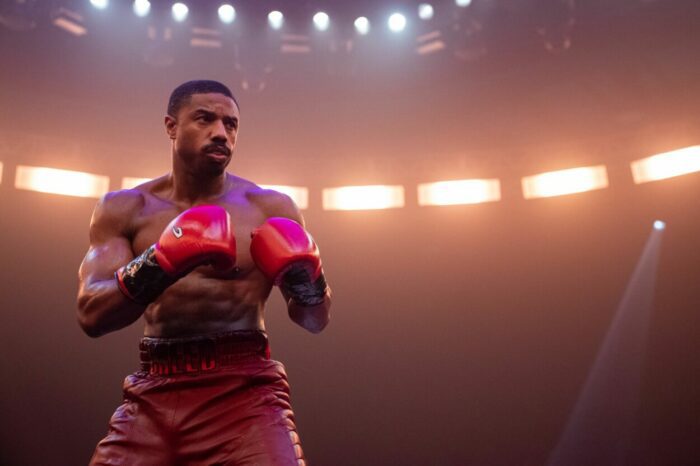
That dangerous presence is the now-adult Damian Anderson, played by the white-hot Jonathan Majors. Eighteen years ago, the up-and-coming Golden Glove amateur from the wrong crowd took the fall for assault and gun charges stemming from an altercation with police when Adonis was able to flee. Dame spent that time in prison while Donnie, as we all know, discovered his silver spoon roots, found famous tutelage, and became the best and most revered boxer of his generation, with the Hollywood Hills riches and comforts that came with that success.
When the newly-free Dame seeks out Adonis, the two reconnect with visible pain and loss coming in different forms and concentrations. For Adonis, it’s unearthed guilt realizing the blessings of his life would not exist if he shared Dame’s indicted fate. For Damian, it’s a tug-of-war between appreciable respect and simmering resentment towards the windfall and acclaim that could have been his instead. Also not innocent in these old sins is Adonis’s adoptive mother Mary Ann Creed (the radiant Phylicia Rashad) who tried to keep Damian’s bad influences and correspondences away from Donnie.
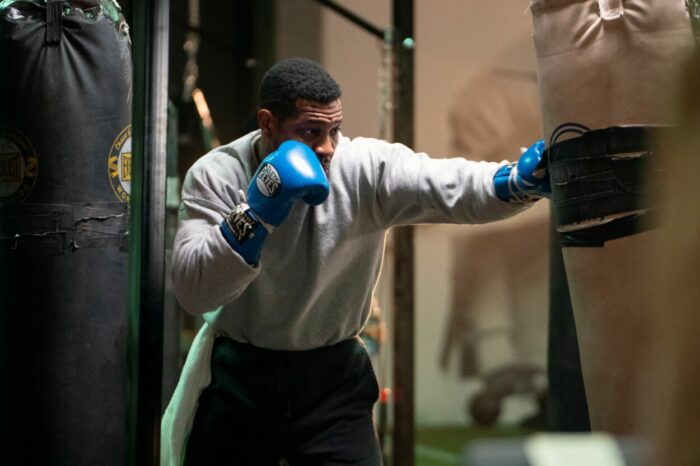
Adonis is in a key position to help Dame earn the boxing trajectory he lost to incarceration. At the Delphi Boxing Academy he runs with the son of his father’s former trainer, Tony “Little Duke” Evers (a returning Wood Harris from Remember the Titans), Donnie gets Damian a training spot as the sparring partner for Felix Chavez (welterweight boxer José Benavidez Jr.), the fighter Adonis is promoting in an upcoming big money title fight against his old rival Viktor Drago (Florian Munteanu from Shang-Chi and the Legend of the Ten Rings). As it turns out, Dame’s fighting acumen and mindset is as menacing and reckless as his record, forcing Adonis to address their shared past, tenuous present, and combative potential future.
Creed III stays very tight on the flaws of two proud men hiding shame. As you can imagine, therapy was never an option for either of these characters, and the narrative is not shy about presenting the long-term effects of child abuse even within burly tough guys. This aggressive intimacy allows for two blistering performances from the lead actors.
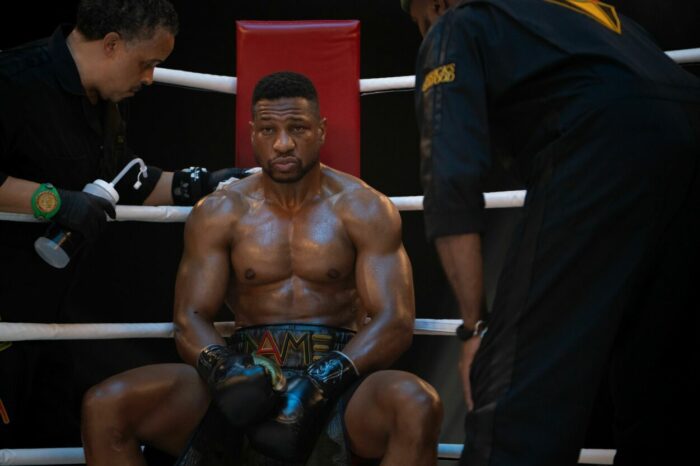
Plenty of Rocky/Creed enemies for decades have been larger-than-life and mostly-hollow caricatures fleshed out to oversell the usual underdog angle of the series. Instead, Creed III borrows the “sympathetic villain” route common to comic book films and creates a twisted and mirrored equal with Dame Anderson. Through Jonathan Majors’ exuding complexity and torment—two tonal modes at which he has become an expert in a short period of time—Dame’s slow-boiling rancor comes out voraciously with every seething and soulful inhale and exhale from the actor in and out of the squared circle. For the second film in a row, Majors is as serious as a heart attack and you can’t take your eyes off of him.
On the other side of life’s shadow-boxing mirror, Michael B. Jordan’s title character shields the explosions brewing inside. It’s not as simple as flipping the switch from Retirement Mode to Hero Mode for the living legend. The cerebral healing and preparation is greater than the physical. Johnson’s journey to unbottle the unforgiven mistakes from his past adds weight to the strong family anchor of the Creed saga that has been supported by Tessa Thompson as his wife Bianca. More than the ripped and sinewy males, she, also holding her own struggles, might very well flex the most emotional muscle of all to lift this tale.
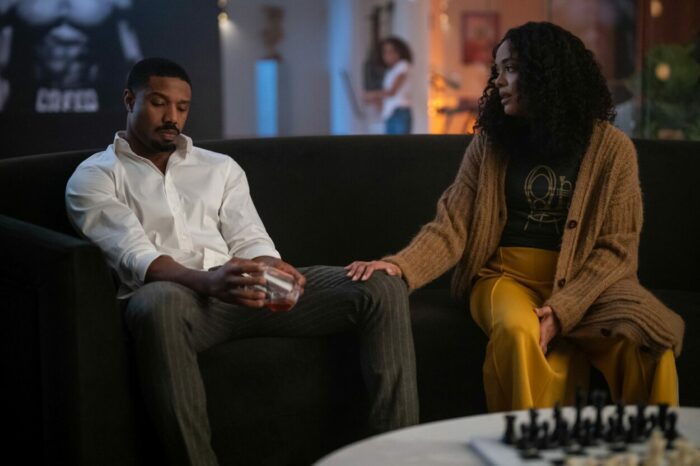
Symbolically, Creed III dabbles with the semantic differences between the verbs of “defend” and “protect.” One could argue the two words stack together in that “protect” means to prevent harm or damage while “defend” is the action taken in order to protect. The boxing, especially when it culminates between two familiar foes, becomes the body language for that delineation. Thanks to creative camera placements from cinematographer Kramer Morgenthau (Respect, Creed II) and kinetic fight choreography mapped out by boxing consultant Robert Sale and supervising stunt coordinator Clayton J. Barber (The Princess, Judas and the Black Messiah), the in-ring parries and dodges are shown off prominently and become as impressive and exciting as landed strikes.
By the time the musical score from up-and-coming composer Joseph Shirley (The Book of Boba Fett) swells up with the fireworks-backed introductions inside Dodgers Stadium, all of the profound dynamics structured by the screenwriting and story team of King Richard Oscar nominee Zach Braylin and the brothers Keenan and Ryan Coogler culminate wonderfully. Creed III breaks from the usual shooting-and-editing templates of boxing movies that vary little from the repeating reaction order of prance, punch, commentator, and crowd.
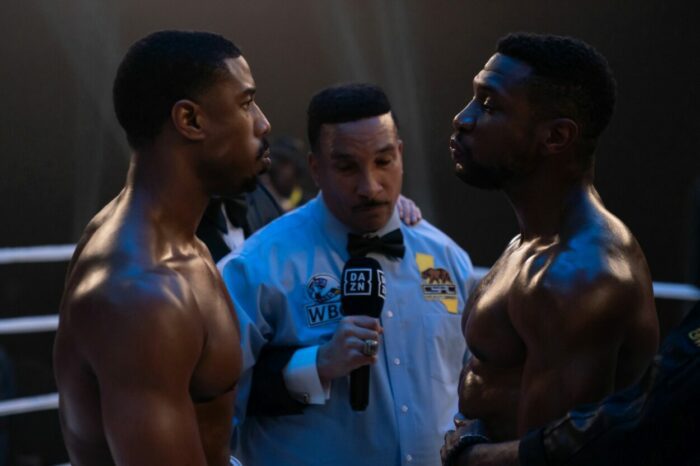
Right when a typical movie would be turning up the hype volume, Jordan strips away, literally and figuratively for a decent stretch, the flashbulbs, play-by-play announcers, and big crowds that are requisite energy vitamins of a sports movie. In a brilliant and intense stylistic departure, Creed III uses a savvy varnish of VFX during the finale to remove the distractions and put the men against backgrounds of their broken road of bad blood. All that matters in that center is them and their issues. No wives, entourages, coaches, fans, or rah-rah spectacle spill into the ring when the boxing grows into fighting and a cathartic ending coda.
In two sharply-composed hours willing to embrace that kind of empathy, Michael B. Jordan and his collaborators offer welcome and compelling depth to go along with the satiation for fisticuffs that fit the humble origins and comfort zones of this now two-pronged franchise that began nearly a half-century ago. The likes of Stallone and the Winkler family are still around as bankrolling producers, but Creed III is a huge, springboarding assertion that this series has evolved to become Michael B. Jordan’s flagship and legacy now. With that aforementioned and assured timing, focus, and control in mind, this sports opus couldn’t be in better taped-up, prepared, and hardened hands.



